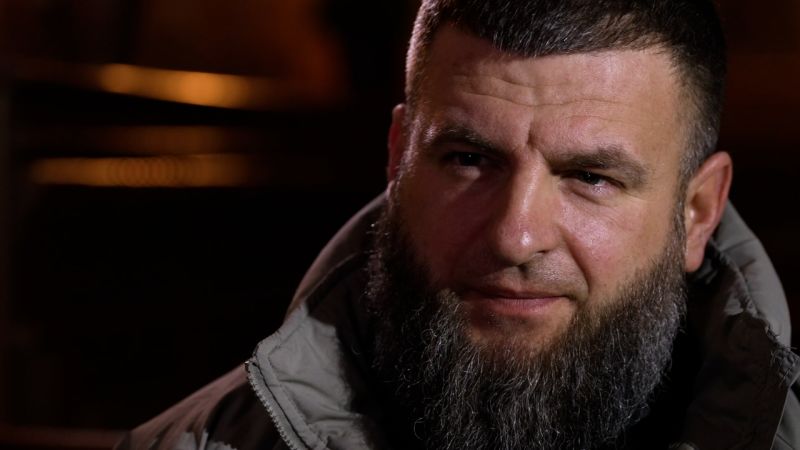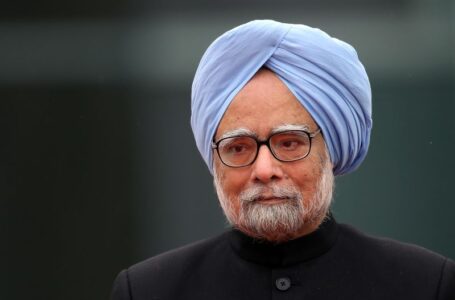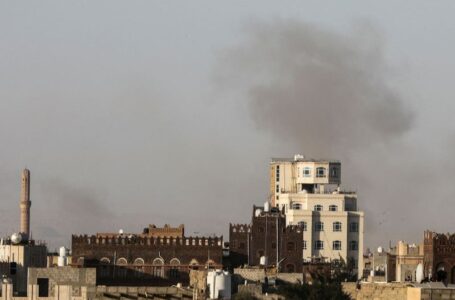Organizers say two sailors have died in Sydney to Hobart yacht race amid wild weather conditions
Captured, injured, but undeterred. One soldier’s life fighting for Ukraine


If one man’s story encompassed all two years of Ukraine’s war you might expect it to have ended abruptly long ago.
Yet Oleksandr, 38, is somehow alive, burdened with lessons from a fight he did not predict.
His prosthetic eye twinkles, damaged from the siege of the Azovstal steel plant in Mariupol, one of the more savage battles of the invasion’s first three months. He exudes gratitude in each breath, having survived the threat of hanging or firing squad while held as a prisoner of war by Russia for more than four months in 2022.
He is fond of punctuating his story with the phrases, “I am no politician” and, “it is in our hands” – perhaps a reflection of how the Western aid that kept Ukraine in the fight for the last two years now partially looks in doubt.
“Of course, the situation at the front is related to the supply of ammunition and related to personnel,” he said. The Russians are “well zombified… [they] win in number… They take land with numbers and drive them forward. We take it with intelligence and tactics. People… just get tired and that’s it. It will be difficult, but we will try.”
Two years into the war, Ukraine is almost back where it was at the start of Russia’s full-scale invasion, digging deep and pleading for Western help. Two expectations from early February 2022 were never realized: that Russia’s superior military would storm through Kyiv in days, and that Western support would be chaotic and fractured.
Yet both ideas are less alien as the war edges into its third year. And Oleksandr’s extraordinary personal sacrifice and loss of friends, and that of many more like him, has bought Ukraine time, but no obvious path to peace.
‘Russian roulette’
When the war began, Oleksandr had already served four years in Ukraine’s armed forces and was near Vodiane, Mariupol, where Russian proxies had waged trench warfare for nearly a decade. Like many, he did not fully believe Western intelligence predictions of a full-scale Russian invasion, or the lack of faith in Ukraine’s military.
“We underestimated our strength – as if someone was deliberately putting a stick in our wheels. But our guys were ready. Those were some of the strongest men I know and have known.”
He had a friend help send his wife and son to Denmark, after hearing reports of the abuse and killing of military families. And slowly, Russian forces pushed the Ukrainians back towards Mariupol’s Azovstal steel plant. The 80-day siege of the plant, where 2,600 troops and civilians endured a constant Russian barrage, became a global symbol of Ukrainian resilience. On May 17, Ukrainian troops began surrendering. Oleksandr said 45 of his colleagues became captives and 400 died there.
Oleksandr said he felt “panic” when he surrendered. “[It’s] a feeling of powerlessness, especially when they take away your weapon. It’s like you’re standing naked.”
There was no guarantee of survival. “It was a Russian roulette. No one there was sure of anything. Moreover, this is a country that… doesn’t keep its word. There had to be a catch, and there was: many people died in captivity. It’s its own type of survival.”
They were held in Olenivka, in occupied Donbas, where Russian-backed proxies had threatened execution by firing squad or hanging. “They basically told me the choice was either hanging or shooting. What difference does it make how you die?”
Those lost haunted him in captivity and still do. “There are many flashbacks, but mostly, my boys are constantly before my eyes. When you look at your friends, your boys who are wounded, you want to help them, but you can’t. Or when you want to feed them, but there is nothing to eat. This is the worst moment.”
More than four months of the daily Russian anthem and boiled cabbage or porridge left him alive but broken. Then, suddenly, they were told they would be moved.
“We didn’t know that we were being released,” he said. “They simply gathered 10 of us there, loaded us into trucks, took us to the airfield at night and put us on a plane. Our eyes were duct taped, no one saw anything. They just took us out and that’s it. You are in Ukraine.”
Multiple Ukrainian soldiers captured in the Azovstal siege, and on other front lines in Ukraine, were exchanged in prisoner swaps with Russia during the last two years.
An image of Oleksandr with colleagues on his release shows him gaunt and drained, a fraction of the rotund, hearty barrel he is now. His left eye is clearly missing in the image, now replaced with a prosthetic, twinkling slightly. He underwent rehabilitation and returned to the front lines around the southern counteroffensive, to train new recruits.
Yet he said he also went back into combat around Urozhaine, one of the most bloody advances of the summer campaign, aided by NATO planning, which hoped to break through towards the coastline around Mariupol. It failed, and the inability of Kyiv’s forces to make significant gains despite billions of dollars of Western aid ultimately led to doubts about its application amongst its allies, and the departure of the military chief, and architect of the offensive, Valery Zaluzhny.
Next steps
What lessons Ukraine learned from its losses and missed opportunity are not yet apparent. Yet combat has taught Oleksandr to value fear, and pass that lesson on to recruits.
“I’m not an iron man, I’m scared too,” he said. “It’s good to have fear in you. You just need to master your fear. If you don’t… it will swallow you up. There were periods [before captivity] when I stopped being afraid, and it was bad. And I put myself in danger.”
He added: “I don’t pity the recruits. Pity is a bad quality. You just have to do your job. And explain to them that they shouldn’t feel sorry for themselves. People just don’t understand what they are capable of.”
He said he forbade his recruits to dwell on the negative, quoting the bible.
Now in Kherson – invaded, occupied, liberated and under assault again, it’s a ghostly city whose path seems to mirror Oleksandr’s.
Oleksandr said he is involved in the bold, perhaps foolhardy, dash to the left bank of the Dnipro River, in a bid to forge a new line of attack on the occupied peninsula of Crimea, first taken in 2014. Ukraine’s gambit, questioned by some Western tacticians and criticized by serving troops, has yet to lead to a notable advance.
It became the latest claim of success by Russia on Tuesday, when its defense minister, Sergei Shoigu, told president Vladimir Putin their forces had cleared Ukraine from the riverbank. Kyiv released a drone video as part of its fervent denial, showing the same Russian troops who planted a flag over the flattened hamlet, fleeing the scene.
Oleksandr refuses to discuss the operation. Yet the likely futility of the foothold Kyiv established in Kherson, is a bleak footnote, one that leads him to echo many Ukrainian troops: their fight is not a choice taken over an easy and peaceful negotiated settlement. A loss spells possible death or internment for the families of soldiers.
“Yes, this is a difficult freedom, I don’t argue,” he said, as shelling reverberated around the liberated yet bombarded city. “But I don’t want to lose it.”
“I don’t want to bend over for some senile idiot,” he said of Putin.
Agonizing decisions await Kyiv: whether to lower mobilization age from 27; which next besieged city to withdraw from; when, if ever, to consider negotiations with the Kremlin; who to give the dwindling ammunitions to. There is no imminent end to Oleksandr’s fight ahead, just the hope he won’t pass it to his son.
“I have hope he will never be part of this war,” Oleksandr said. “So we need to learn from our mistakes.” His son is 7 years old.











